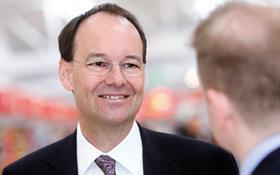
Sainsbury's has reported its first full-year loss for 10 years as like-for-like sales fell 1.9 per cent for the 52 weeks to 14 March 2015.
Underlying pre-tax profit fell by 14.7 per cent to £681 million, compared with £798m the year before, and the UK's third-largest retailer made a loss before tax of £72m.
CEO Mike Coupe blamed the UK marketplace, which he said is changing faster than at any time in the past 30 years, for the impact on profit, but said he is confident the company is taking the “right decisions” to become fit for the future.Results were also hit by a reduction in value of some of its stores.
“We are making good progress with our strategy, and our investment in price and quality is showing encouraging early signs of volume and transaction growth,” Coupe said.
“We also have significant opportunities to grow our business. Clothing, general merchandise and financial services have all performed well over the past 12 months, as have our convenience and online channels. We have a significant ambition to grow these areas over the coming years.”
Analyst at Planet Retail, David Gray, said: “As anticipated, Sainsbury’s has reported its first full-year loss in almost a decade when property writedowns and other one-off factors are taken into account.
'The results mark a sharp departure from the ‘good years’ of consistent profit. The simple fact is that supermarket property assets are now worth far less, particularly sites that would have been originally earmarked for big-box.
“Even on an underlying basis, Sainsbury’s trading performance continues to slip, with like-for-like declines the new normal for a retailer that, only 12-18 months ago, was leading the Big Four performance-wise. Sainsbury’s is feeling the pressure from discounters continuing to lure away more affluent shoppers coupled with Tesco’s nascent domestic recovery. As the latter gathers pace, Sainsbury’s will appear increasingly vulnerable.'
Buit he added that Sainsbury’s has some 'structural advantages' over rivals. 'There is its convenience portfolio, which is large and growing fast. Also, it has more limited exposure to big-box, meaning its property writedown will be a fraction of rival Tesco’s nearly £4 billion,' he added.
Chairman David Tyler said Sainsbury’s is a business built on strong foundations.“With our grocery business at the core, we are confident that we can grow shareholder value through our increasingly multi-channel offer,” he said.
“We will maintain the strength of the balance sheet by making significant cost savings, improving working capital and reducing capital expenditure.”



